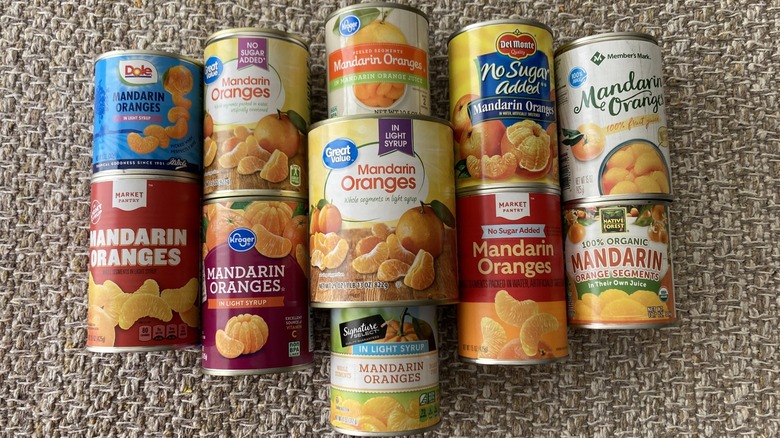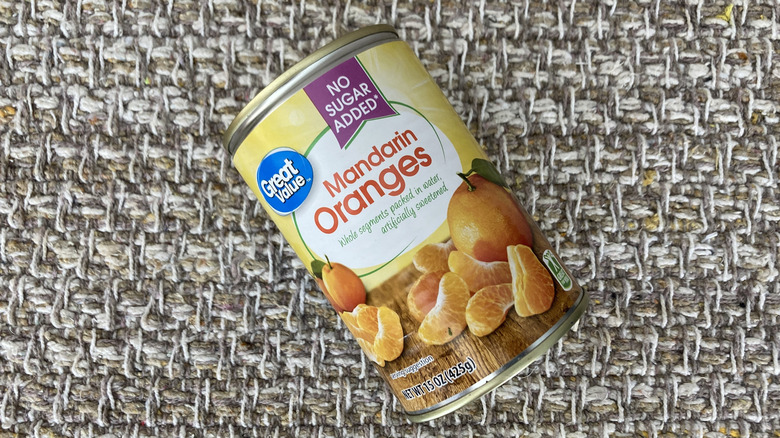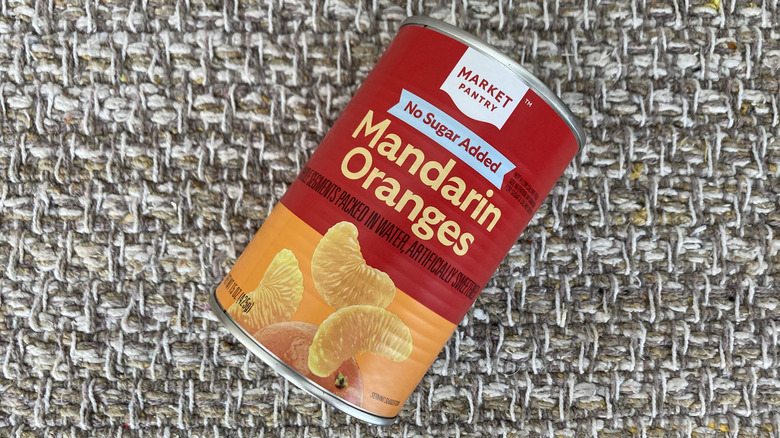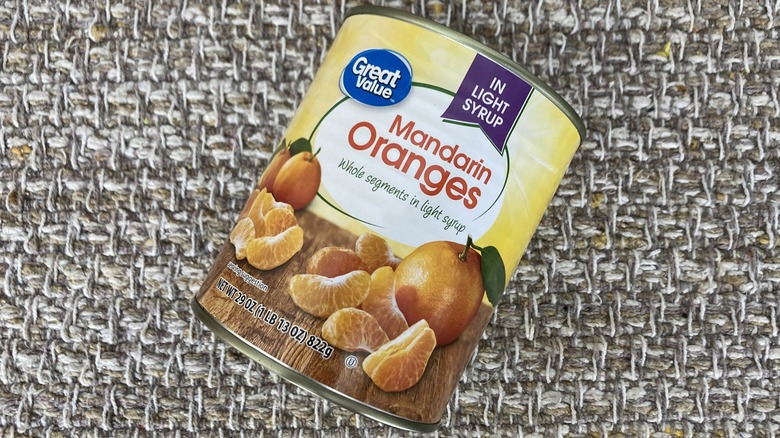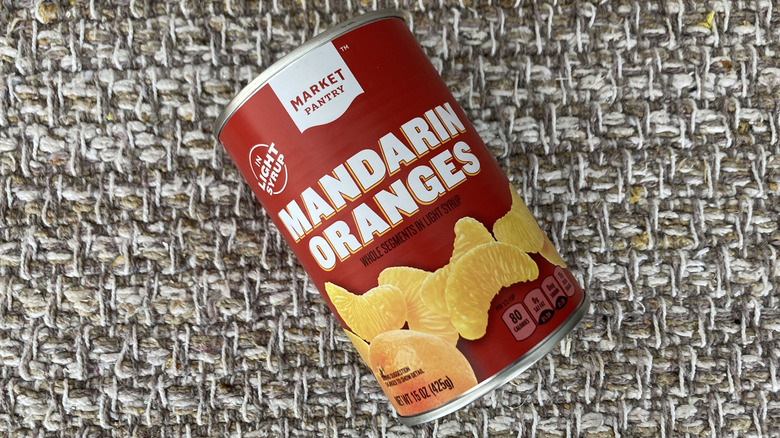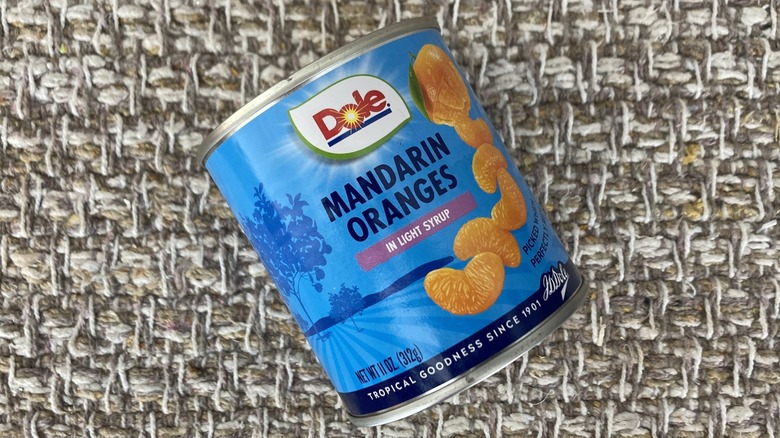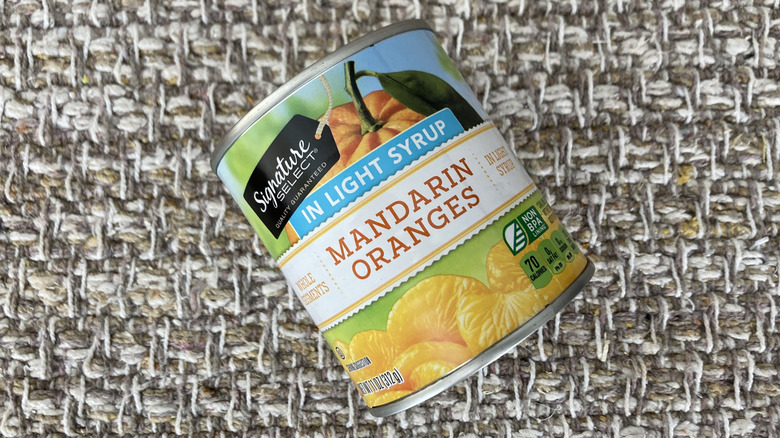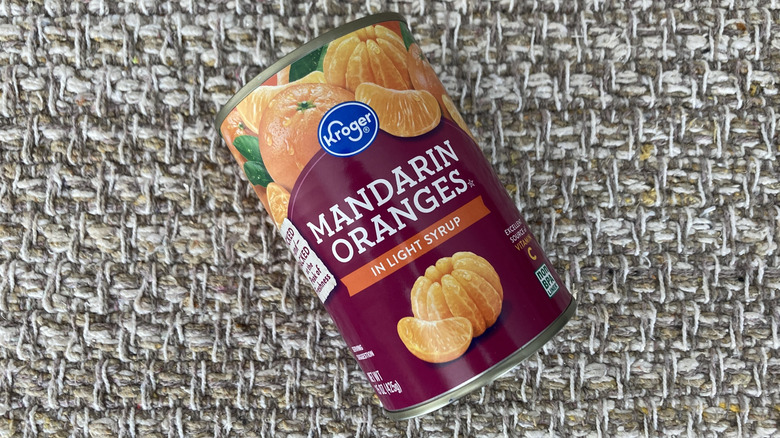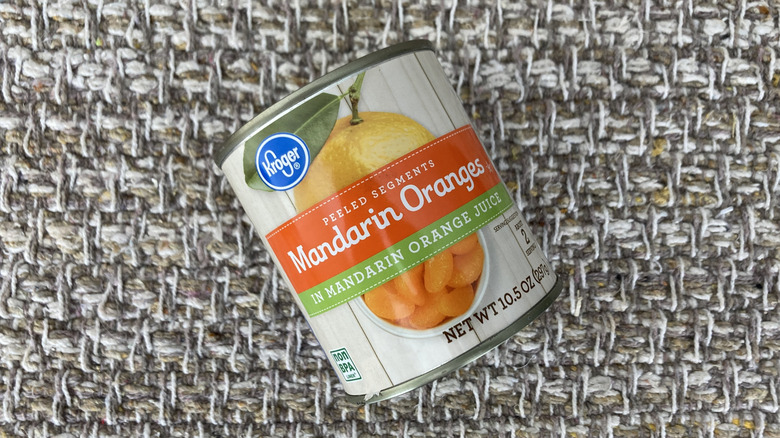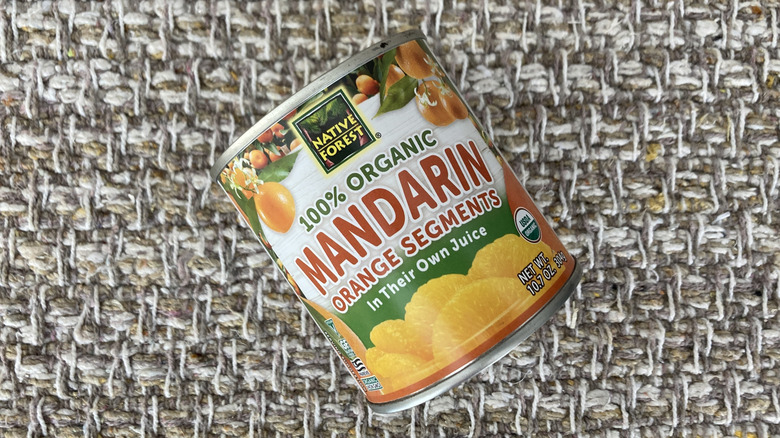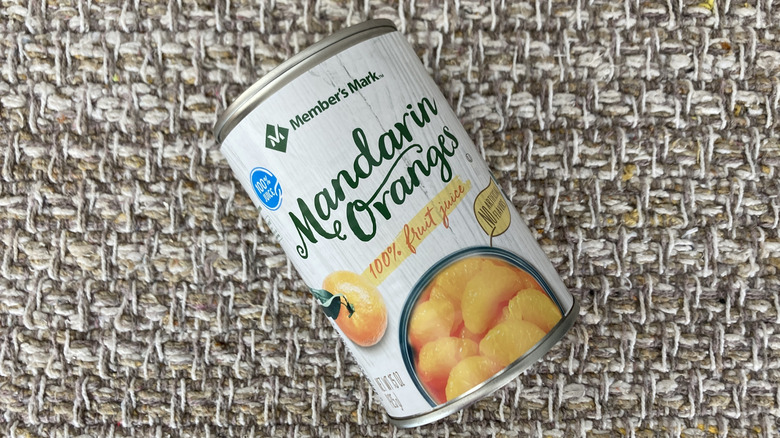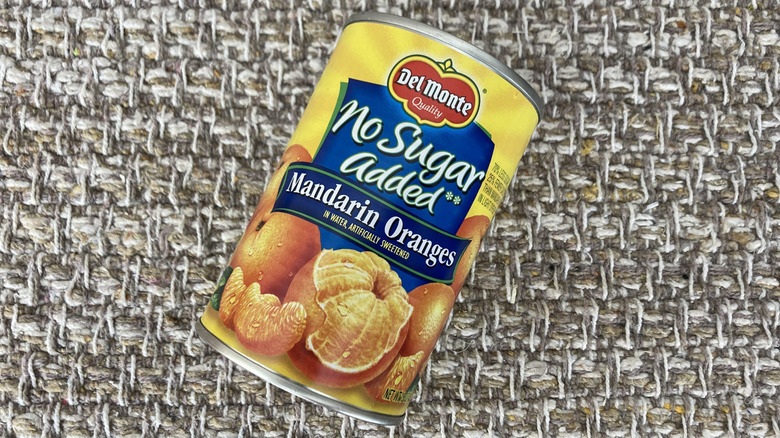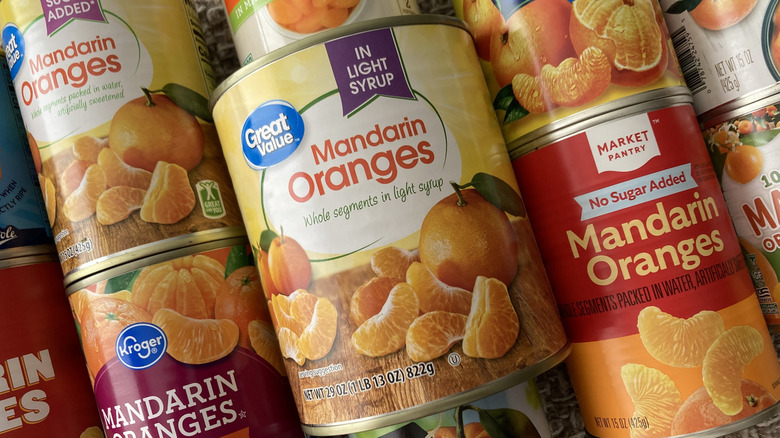11 Canned Mandarin Brands, Ranked From Worst To Best
Deep in the hinterlands of the grocery store, far from the lush, misted section where citrus fruit is allowed to mingle freely in a freshly-picked fellowship, there exists tamed cans of tiny orange slices that offer the assurances of ripe, tangy sweetness in every bite. The specimen in question: the canned mandarin. If you're a clever shopper and you make a stealthy path through the canned food realm, you may find a selection of these brightly-flavored bite size bits waiting to take their place atop your breakfast oats, in your dinner salads, and among your healthier midday snack selections. Whether you choose mandarins for nutrition or mere enjoyment, canned mandarins make it easy to taste the sunshine flavors of citrus all year round.
Which brands of canned mandarins are the most prized among the masses and which should be left to roam the wilds instead of coming home to roost in your pantry? I set out on a satsuma safari to locate the various stock and evaluate their flavors to determine the prime specimens and weed out the weak members of the herd. Yes, I was worried about what might happen if I ate too many oranges all at once, but I dove in regardless. Clearly, there's no length I won't go to when it comes to making sure your canned mandarin choices are prime. Not all heroes wear capes; some of us carry grocery store membership cards and reusable bags instead.
11. Great Value Canned Mandarin Oranges in Water
Water is about the most innocent liquid you can hope to find your mandarins saturated in when it comes to the canned versions. Having a Great Value option for water-packed canned mandarins that keeps syrup out of the formula might light up your bargain-loving heart; not only can you enjoy these petite slices on the cheap, but you can also count on zero additional sugar to complicate your attempt at adding more fruit to your diet. However good Great Value canned mandarins in water might look on paper, it looks like a huge mistake once you crack open the can and taste the contents.
It's unclear whether the fruit was subpar before it was canned or if being packed in whatever quality water Walmart uses dissolved the connective membranes of these mandarins, but these orange slices were mushy to the point of goo. They fell apart as I tried to scoop them up, like they were resisting their further demise. I tried not to take it personally, but it was hard not to think Great Value mandarins knew what they were in for and decided to make the process as messy as possible. I see it as a personal victory that they were also the blandest oranges of all the cans I tried. These sad, sludgy slices are consistent, if nothing else.
10. Market Pantry Mandarin Oranges No Sugar Added
Market Pantry addresses the all-natural sweetness elephant in the room by canning mandarins with no sugar added, an alternative to the label's light syrup version that uses artificial sweeteners like sorbitol, sucralose, and acesulfame potassium instead. The result is a can of oranges that taste wildly sweet while lacking the citrus spirit anyone shopping for proper mandarins is looking for. It turns out to be a juicy, sugary nibble with no bite — defanged by the inclusion of so many chemical sweeteners, my tongue couldn't make sense of what it was tasting.
The fact that these mandarins were very sweet without being very orangey opened my eyes to the possibility of Target using less-than-ideal fruit doctored with sweeteners to achieve a product that's presumably more health-friendly. Yet even with the artificial stuff, the sugar content per serving is still 18 grams, which isn't exactly low. If you have fruit with natural sugar and you pile on the artificial sweeteners, you might be working against your own objective, which should be providing a nutritious canned product that tastes like fruit, only better. In this case, Market Pantry mandarins taste like fruit, only worse.
9. Great Value Mandarin Oranges in Light Syrup
Great Value does its best to trick consumers into thinking its canned mandarins in light syrup is a healthier way to go. But your doctor isn't likely to tell you to chug a glass of light syrup to improve your well-being anytime soon. Likewise, if you consult your physician about eating canned mandarins as a path to wellness and you mention the Walmart version soaked in light syrup, you're likely to get a little speech about how you could spend your money on fruit that isn't suspended in melted sugar — both for the sugar content and the incredible lack of joy you're bound to find in this can.
My first bite of these mandarins practically made my tongue fall asleep; they're that unremarkable. The segments are notably smaller than the other cans I sampled. I tried another bite to see if I could wake up my snoozing taste buds, and what I noticed is what any mandarin fan would cringe to know they paid for. The syrup in the can actually makes these segments taste like peaches more than miniature oranges. The sweetness is so middle-of-the-road that it strips the personality out of the mandarins and leaves them bland and without a personality of their own. If I'd wanted peaches, I would have bought them. But I wanted mandarins, or at least I needed them for the round-up, and it felt like I got generic canned fruit instead. It's hard not to feel ripped off from this can. I'm still working through my feelings about it.
8. Market Pantry Mandarin Oranges in Light Syrup
Target goes for the gold — or the orange — with a can of mandarins with light syrup added to sweeten up the situation. This lesser-priced label gives conscious consumers a more favorable mandarin selection to toss into salads and throw into yogurt, though the syrup should give the health-minded eater cause for pause. Sure, it'll help with the sweetness, but you don't get any say regarding how much sugar your slices soak up. If syrup is going to be an ingredient, it had better serve its purpose spectacularly.
In the case of Market Pantry, the syrup only serves to make the scenario stickier. I found these mandarins to be sweet on first taste and even sweeter on second taste. I tried them a third time, hoping to detect something more than just sugar — a bit of orange flavor in a mandarin doesn't seem like too much to ask. Sadly, even after three bites, I couldn't find the tell-tale tingle that gives mandarins a touch of sophistication. Even with the preferable price, it's best that you leave Market Pantry on the shelf, especially if oranges are your thing. These unspectacular segments are likely to change your mind.
7. Dole Mandarin Oranges in Light Syrup
Dole is such a trustworthy name in the fruit game that seeing the logo on a label of canned mandarins is sure to light up the healthy eating centers of the average shopper's brain. Dole mandarins in light syrup seem determined to rock the company's steady reputation. Who would've thought the brand with its labels on fresh pineapples and bananas would go sour with mini-oranges in a can? Maybe fruit in its most natural form is what Dole does best.
What went wrong with this tin of tiny wedges? In three words: syrup, syrup, and syrup. Even with a lighter version of this soaking liquid keeping things loose and juicy under the lid, the end result becomes orange slices that taste like fruit cocktail — you know, the kind where you can't tell a peach from a grape from a chunk of pear? If you want a fruit cocktail, there are plenty of possibilities to choose from. But if you're after mandarins with that exciting tangy flavor to add to your ambrosia salad or candy corn parfait (no, really ... it's a thing), Dole isn't doling out the right can for your plans.
6. Signature Select Mandarin Oranges in Light Syrup
Frequent shoppers at Safeway and Albertsons stores have come to expect a certain quality from Signature Select items, the company's flagship house label. But the chain makes a major misstep when it comes to canning mandarins and keeping them in a form that can be recognized as orange slices. The unfortunate shopper who takes a can home hoping to use these wedges as layers in a trifle will be stunned when they peel back the lid to find mandarin mash instead of mandarin segments.
It seems fundamental that the fruit inside should at least look like fruit when you're finally ready to eat it. Whether it's the syrup that causes the slosh or just a poor choice in fruit at the factory, this can was difficult to scoop without turning into pulp. Just when I thought maybe it would make a solid citrus vinaigrette or other orange recipes that don't require whole fruit, the taste test revealed a super sugary flavor that concealed any semblance of sharp citrus. In essence, this was a can of orange juice that might work best if the contents were frozen and blended into sorbet. But as canned mandarins go, it's something of a syrupy mess.
5. Kroger Mandarin Oranges in Light Syrup
Consuming syrup is pretty much the opposite reason for eating mandarin oranges. If you're looking for natural sweetness in a bite-sized fruit that's ready to go right out of the can, the last thing you'd want to do is soak it in sugar and undo all the health benefits. Kroger skirts the issue by packing its slices in light syrup, which is a simple combination of sugar and water. By contrast, heavy syrup also includes corn syrup. Even with this alteration, a serving still provides 20 grams of sugar, something to be aware of if watching your sugar intake is a part of your nutritional habits.
All sweeteners aside, Kroger piles its can high with segments that are smaller than the other cans I sampled, a notable difference for home bakers planning on using canned mandarins for a fruit tart or as cake decorations. Though the taste was vaguely orange even after my second sampling, the more I ate, the more I realized sweetness is more the flavor here than anything else. Having lighter syrup will eliminate unnecessary corn syrup consumption, but you may have to fish a little to find the mandarin flavor in these sweet pieces.
4. Kroger Mandarin Oranges in Mandarin Orange Juice
Mandarins swimming in orange juice sounds like a brightly-flavored good time for fans of outrageous orange flavor. Kroger takes a whack at pairing fruit with juice and comes up with a tangy take on canned mandarins that keeps shoppers from spending too much. It's such a simple yet inspired blend, it's surprising that more brands don't give it a try. Maybe there's a premium on orange juice as can filler, even if the fruit going into the can is also an orange. That's a shame; the double-up gives enough orange flavor to smack your taste buds in the best possible way, all without having to peel an orange yourself.
I was pleasantly surprised to find that rather than being overly sweet, the flavor was relatively tart. Bright orange flavor abounds here, with a fun mix of complex mandarin and more simple juice flavors, though the label informed me that it's only mandarin juice used. Adding citric acid as Kroger does kicks up the tingle by a factor of "yum!" What keeps this can from topping the mandarin pyramid is the mushy texture. If you can separate your hopes for little segments bursting between your teeth, you'll definitely enjoy what Kroger is providing here. A little more caution with keeping the fruit intact and this brand would've had a top-three spot in the can.
3. Native Forest Mandarin Orange Segments in Mandarin Juice
For fans of lightly-sweet but supremely tangy canned mandarins, Native Forest is a prime pick. I'd never heard of the brand before doing research for the round-up, but it turned out to be a real winner when laid against the better-known brands. The one drawback is the price; though rumored online to be available at my local grocers, I only found it in stock at Amazon at a list price of nearly $6. The fact that they're organic mandarins might justify the purchase, if you're a stickler for purer food.
What makes these slices so superior? They're vibrant and tangy, but not overly sweet, which sounds odd for a fruit with a reputation for leaning toward the sugary side of the spectrum. Being packed in mandarin juice helps the intrinsic flavors burst through in every bite. There's no syrup or other fruit juices trying to pull a fast one on your tongue; it's all mandarin magnificence from start to finish. If the price were just a little lower and the cans easier to find, Native Forest would have ranked even higher on the list. As it stands, top three is not a bad landing spot for an orange with natural appeal. I'll show myself out.
2. Member's Mark Mandarin Oranges in Fruit Juice
Sam's Club helps patrons get their hands on canned mandarins sozzled in fruit juice, a novel twist that's halfway between water and syrup and seems to have a light enough touch to work its magic without ruining the spell. I was leery of this one, though there wasn't a clear reason; I'm a fan of other Member's Mark products and should have known the brand wasn't likely to compromise its record with a mandarin-flavored misstep. It's nice to know the Walmart version of Costco makes above-average versions of products at below-average prices, canned mandarins included.
Despite being packaged in pear juice rather than orange juice, Member's Mark mandarins make an impression by letting their bright light shine through. These segments are lightly sweetened, with a mellow orange essence that doesn't come across as overly sugary, despite a little help from a different fruit-based sweetener. These would make a delightful addition to an Asian salad or a mix of cranberries, spinach, and feta. You could also stand over the sink and finish the can with a spoon if you choose. I almost did. In fact, I still might.
1. Del Monte Mandarin Oranges No Sugar Added
Shouldn't fruit be sweet enough to not need additional sugar? Crops can be quirky and food producers can't always depend on ripeness, necessitating a syrupy solution to ramp up sweetness. Del Monte No Sugar Added puts forth canned mandarins that depend on their own innate sugars to make the fruit palatable, using only water to keep them moist inside the can. It's a daring move in a grocery sphere in which ensuring your product is plenty sweet is plenty important. Thumbs up to Del Monte for jumping into the canned mandarin shark tank without a cage.
Luckily for Del Monte, the risk pays off in a big way. These mandarins were by far the most flavorful of the selection, alternating between brightness and sweetness without losing the balance. The segments hadn't turned to mush like many of the other cans I tried, and rather than having syrup soak into every piece to make the slices taste uniform, the natural juice of the fruit infused the water, providing a lightly-flavored liquid I didn't need to rinse off to taste the fruit itself. At just under $3, it may be one of the pricier cans available, but you'll appreciate the quality here, especially if you plan on incorporating your mandarins in a recipe where taste and texture are essential. For mandarins like this, the juice is more than worth the squeeze.
How I ranked these canned mandarins
For a relatively humble fruit that's perfectly flavorful on its own, mandarins sure take on different tastes and textures when subjected to the canning process. Even simple standards like "in light syrup" and "in fruit juice" take on different dimensions depending on the producer's idea of how to make mandarins as tasty and fresh as possible. Unfortunately, not all of these concepts work as intended, resulting in a wide variety of mandarin oranges with vastly different virtues.
To gather my list, I searched for the most readily-available store brand canned mandarins, which included national brands, store labels, and specialty offerings. I opted for different takes on how mandarins are canned to see how syrup, juice, and water affect the taste and texture of the fruit. To get the purest taste possible, I drained the liquid and tasted the fruit twice, once for immediate response, then once again to confirm or augment my initial findings. This gave me a sense of what the fruit would offer if eaten alone or as an ingredient in a recipe. I gauged quality of flavor, brightness, sweetness, and texture, which turned out to be a spectrum of its own. Some cans were so mushy, the fruit would be unpresentable as part of a salad or a more visually impactful dish.
